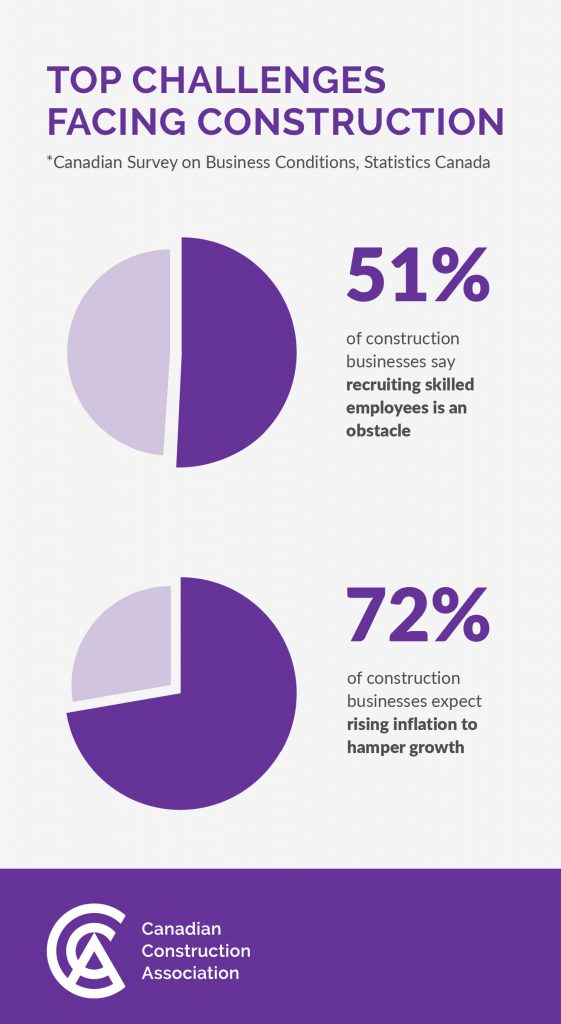
Declining labour, inflation and rising interest rates leading to slow growth in the construction industry
Inflation and the shortage of workers continue to preoccupy construction businesses, according to a Statistics Canada survey measuring business conditions and expectations for the third quarter of 2022.
Data for the Canadian Survey on Business Conditions was collected from July 4 to August 8, 2022.
While one-third of businesses reported the recruitment of skilled workers as an obstacle to growth, 51 per cent of respondents from the construction sector specifically said they do not have access to the labour they need.
The rising costs of inputs was also cited as a challenge to growth, with 72 per cent of respondents from the construction industry saying they expect inflation to put further pressure on contractors.
CCA has been working on various initiatives to help offset the impact of inflation and workforce shortages, with a focus on construction as a career of choice, more favourable immigration policies, and subsidies to hire apprentices.
As job vacancy rates grow and competition for talent becomes more fierce, the federal government needs to look to expanding the Temporary Foreign Workers program and facilitating the entry of skilled immigrants interested in working in the construction sector. CCA’s Talent Fits Here campaign will support this by targeting those interested in a career in construction, whether they are currently in Canada, or considering immigrating to Canada. This will help attract skilled newcomers and drive economic growth.
CCA has also partnered with the Canadian Apprenticeship Forum on a federal government initiative offering financial incentives to employers who hire new first-year apprentices in 39 Red Seal trades. This program will provide support to employers wanting to hire apprentices and promote the skilled trades as a first-choice career for youth, women, Indigenous peoples, LGBTQ+, immigrants, and foreign workers.
GDP marks slow growth for construction
The non-residential sector posted a contraction of one per cent during the second quarter. This decline coincides with the economic slowdown following aggressive interest rate hikes instituted by the Bank of Canada to control inflation.
Industries that require large sums of capital invested over long periods, including the financial, insurance, real estate, and construction sectors, are more sensitive to interest rate changes. It is not surprising that these industries saw the largest output declines during Q2 2022, and with the most recent hike on September 7, it’s expected that construction may slow down even further.
CCA and our participating members are looking forward to voicing these issues on a national scale during our annual Hill Day meetings with parliamentarians on November 15.

Key takeaways
- 50% of businesses expect the rising costs of inputs to be an obstacle in the next three months. This number jumps to 72% for the construction sector.
- 51% of respondents from the construction sector say labour shortages will continue to challenge the growth of the sector.
- Interest rate hikes will likely lead to further declines in output in the non-residential construction sector.
- CCA members are meeting with parliamentarians on November 15 to discuss initiatives to help expand Canada’s construction workforce.
- Learn how you can participate in the Apprenticeship Service. The program offers eligible employers $5,000 per apprentice per year for a max of two Level 1 apprentices per employer. The amount is doubled if the apprentice identifies as being from an underrepresented group.

